Ad Astra 4K Blu-ray Movie
HomeAd Astra 4K Blu-ray Movie 
4K Ultra HD + Blu-ray + Digital Copy20th Century Fox | 2019 | 124 min | Rated PG-13 | Dec 17, 2019
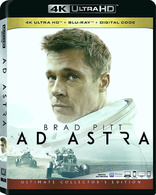
Price
List price:Amazon: $24.42 (Save 21%)
Third party: $24.42 (Save 21%)
Only 1 left in stock (more on the way).
Movie rating
7 | / 10 |
Blu-ray rating
| Users | 4.2 | |
| Reviewer | 4.0 | |
| Overall | 4.0 |
Overview
Ad Astra 4K (2019)
An Army Corps engineer searches across the galaxy for his father, who disappeared on a mission to find alien life 20 years ago.
Starring: Brad Pitt, Tommy Lee Jones, Ruth Negga, Donald Sutherland, Kimberly EliseDirector: James Gray (I)
| Sci-Fi | Uncertain |
| Drama | Uncertain |
| Adventure | Uncertain |
| Mystery | Uncertain |
Specifications
Video
Video codec: HEVC / H.265
Video resolution: 4K (2160p)
Aspect ratio: 2.39:1
Original aspect ratio: 2.39:1
Audio
English: Dolby Atmos
English: Dolby TrueHD 7.1 (48kHz, 24-bit)
French: DTS 5.1 (48kHz, 24-bit)
Spanish: DTS 5.1 (48kHz, 24-bit)
German: DTS 5.1
Italian: DTS 5.1
Japanese: DTS 5.1
Spanish: Dolby Digital 5.1
Czech: Dolby Digital 5.1
Hungarian: Dolby Digital 5.1
Polish: Dolby Digital 5.1
Subtitles
English SDH, French, German, Italian, Japanese, Spanish, Czech, Danish, Dutch, Finnish, Hungarian, Korean, Norwegian, Polish, Swedish
Discs
Blu-ray Disc
Two-disc set (2 BDs)
Digital copy
4K Ultra HD
Packaging
Slipcover in original pressing
Playback
Region free
Review
Rating summary
| Movie | 4.0 | |
| Video | 4.5 | |
| Audio | 5.0 | |
| Extras | 0.5 | |
| Overall | 4.0 |
Ad Astra 4K Blu-ray Movie Review
Reviewed by Jeffrey Kauffman December 15, 2019Ad Astra is certainly one of the odder science fiction epics to come down the pike and/or Milky Way in some time, which may be why despite an impressive physical production and interesting performance from star Brad Pitt it seemed not to connect in an overwhelming way with ticket buying audiences. While Ad Astra plies the same “search for intelligent life” territory that any number of venerable cinematic antecedents like 2001: A Space Odyssey and Star Trek: The Motion Picture have, in this case it does so within the context of a focal character who has some pretty significant “Daddy issues”, issues which provide a lot of emotional grist for the mill as the story unfolds. Major Roy McBride (Brad Pitt) has been a devoted astronaut working for the NASA-esque SpaceCom (Space Command), and in one of the film’s more inventive reveals, his opening voice over and some quick montage-like vignettes which seem to be resolutely Earthbound ultimately offer the thrilling sight of McBride climbing out onto the ladder of a space station situated high above the Earth. When a mysterious series of electromagnetic charges hit the space station, McBride is sent hurtling toward Earth, but his calm demeanor (something that itself plays into the plot) keeps him from panicking, and rather incredibly he’s able to deploy a parachute and land safely. His insanely low resting blood pressure barely notching upward in this trauma alerts his higher ups that he’s one cool cucumber, and he is tasked with heading a secret mission to discover the source of the disruptions, jolts which have been dubbed The Surge and which are wreaking havoc on Earth, causing unparalleled power outages and deaths. In one of the film’s ultimately kind of silly conceits, it turns out that SpaceCom is convinced that Roy’s legendary father H. Clifford McBride (Tommy Lee Jones), himself perhaps the most famous American astronaut of all time, may be behind the maelstrom, somehow sending the pulses from an American installation near Neptune known as The Lima Project. The fact that The Lima Project hadn’t been heard of from decades and that all of its participants have been assumed dead for nearly that long underlies the mystery.
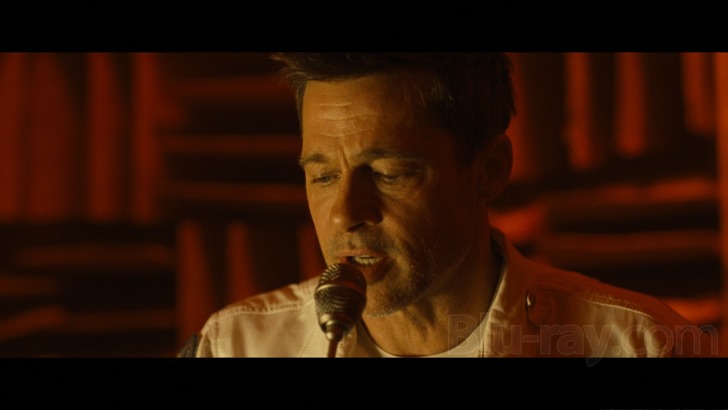
Part of the problem some audiences may have had with Ad Astra is that its features a focal character who is pretty much divorced from his own emotions, as is repeatedly documented throughout the tale, and which in fact seems to be the ultimate point of the screenplay co-written by director James Gray. Gray is evidently on record as stating that he wanted Ad Astra to be yet another cinematic evocation of Joseph Conrad’s epochal Heart of Darkness, and one need only refer to Apocalypse Now or at least Hearts of Darkness: A Filmmaker's Apocalypse to know how calamitous that desire might be. But if Conrad’s tale, and even Coppola’s version, documents a character coming to terms with a certain feral tendency in human behavior, Ad Astra is curiously tamped down, even when it gets to its climax, offering Roy as a virtually emotionless centerpiece who kind of drifts through a number of amazing experiences without having any sizable reactions to them, at least on the surface.
There’s a subtextual element here which basically boils down to whether or not Clifford McBride is a “Kurtz” or not (for those not conversant with Heart of Darkness and/or Apocalypse Now, Kurtz was the crazed villain of the piece). But aside from any allusions to Joseph Conrad, it’s probably Stanley Kubrick who may seem most evoked in Ad Astra. Gray has the same kind of contemplative quality that Kubrick’s science fiction masterpiece offered, and in fact in some of the languid shots of spacecraft floating through a starfield, I half expected to hear either Richard or Johann Strauss on the soundtrack. Perhaps more importantly, though, the plot trajectories in both films posit the “evolution” of a focal character who is hardly given over to any kind of histrionic displays, something that can tend to keep the viewer at arm’s length at times. If the “father” in 2001: A Space Odyssey might be thought of as more of an opaque (literally) cosmic Being, in Ad Astra it’s personalized. As such, Roy is not “reborn” as a Starchild a la Dave in 2001: A Space Odyssey, but he does finally connect to a deeper if not intrinsically “higher” version of himself.
The problem with these similarities for some viewers may be due to the fact that Kubrick seemed to be constructing a largely intellectual enterprise in the first place, whereas Gray seems to be making a case that people need to really connect with their own emotions in order to be fully functioning human beings. Having a main character who comes off as an automaton for virtually an entire film may not ultimately be the best way to depict that need.
Ad Astra 4K Blu-ray Movie, Video Quality 
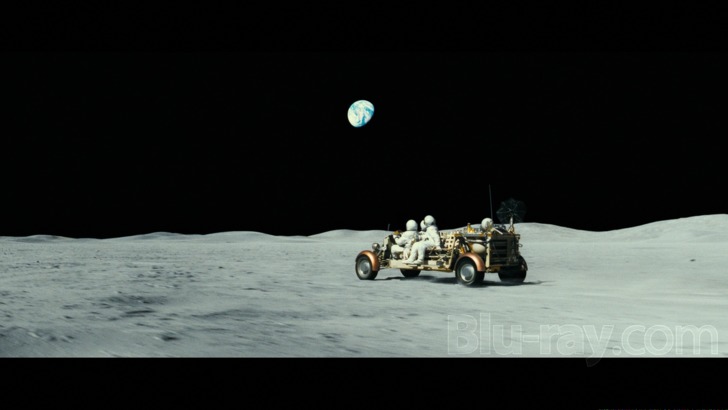
Note: Screenshots are sourced from the 1080p Blu-ray.
Ad Astra is presented in 4K UHD courtesy of 20th Century Fox Home Entertainment with a 2160p transfer in 2.39:1. As outlined in our Ad Astra Blu-ray review, Ad Astra was shot on film with a
variety of cameras and lenses, and then finished at a 2K DI (the IMDb initially listed this as having been finished at 4K). This was a rather interesting
viewing experience for me in its 4K version, for at least a
couple of unusual reasons. There's consistent uptick in detail throughout this presentation, and HDR definitely adds some highlights to the palette
(both of which I'll address in a moment), but kind of surprisingly what struck me repeatedly about the increased resolution of this presentation were
both what I'm assuming are digital lens flare effects and some rather wide variances in grain resolution. I frankly hadn't noticed how many lens flares
and similar prismatic effects dot the presentation, but just pay attention during the opening scene on the "space antenna" for copious examples. While
grain often resolves in a nicely organic fashion, there are some pretty dramatic spikes in grittiness at times. Perhaps exacerbated by the fact that it's
both lit and graded toward yellows, the whole sequence beginning at around 1:03:30 shows a decidedly chunkier grain field that has a yellowish tint to
it. Kind of interestingly, once Roy gets back "up top" as he surreptitiously moves to board a spaceship, there's a relative lack of grain, giving
that moment more of an HD video look. There are other very brief moments, including what amount to quasi-flashbacks, where grain is very
pronounced (circa 1:17:50 is an example). All of this said, there's a noticeable uptick in fine detail levels across the board here, though once again the
increased resolution tends to point out stylistic quirks like Roy's first "psych evaluation" which seems to be delivered to some kind of glass and looks
almost out of focus as a result. The palette assumes so nicely burnished hues in this version, with the opening titles and sunburst (once again with
prevalent lens flare) looking slightly more orange-red, a toning that is duplicated in the scenes where Roy is recording messages for his father. The
final scenes with Roy and his father offer some almost cobalt blues in this version.
Ad Astra 4K Blu-ray Movie, Audio Quality 
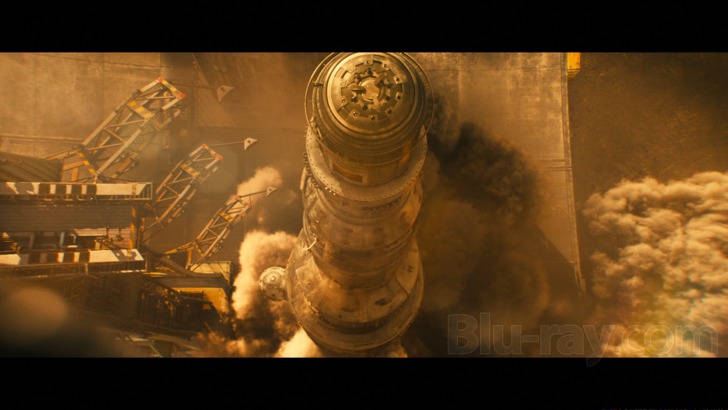
Ad Astra has a really nicely rendered Dolby Atmos track, a listening experience that takes the already excellent DTS-HD Master Audio 7.1 track on the 1080p Blu-ray and (literally) elevates it. From the opening hum and pulse effects that underlie some of the production mastheads, there's a clear vertical presence, something that really kind of bursts with considerable energy once Roy steps outside on the space antenna and the power surge occurs. There's consistent engagement of the Atmos channels in the many flight sequences, and this track duplicates the very powerful LFE that the DTS-HD Master Audio 7.1 track offered in terms of some of the thrusters utilized during takeoffs and landings. Max Richter's score sounds great here as well, and all dialogue is rendered without any problems. We've gotten spoiled with a lot of really fine sound mixing in big sci-fi epics, but this Atmos track is another reminder of how much fun well mixed and designed audio can add to a movie going experience.
Ad Astra 4K Blu-ray Movie, Special Features and Extras 
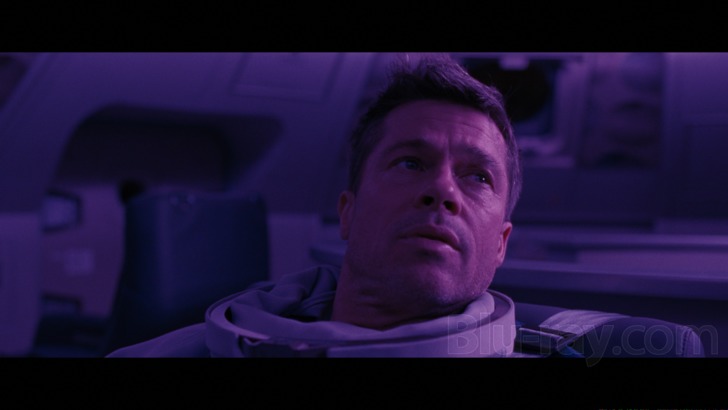
The 4K UHD disc contains the Audio Commentary by James Gray also found on the 1080p Blu-ray disc included in this package. For the rest of the supplements on the 1080p Blu-ray disc, please refer to our Ad Astra Blu-ray review.
Ad Astra 4K Blu-ray Movie, Overall Score and Recommendation 
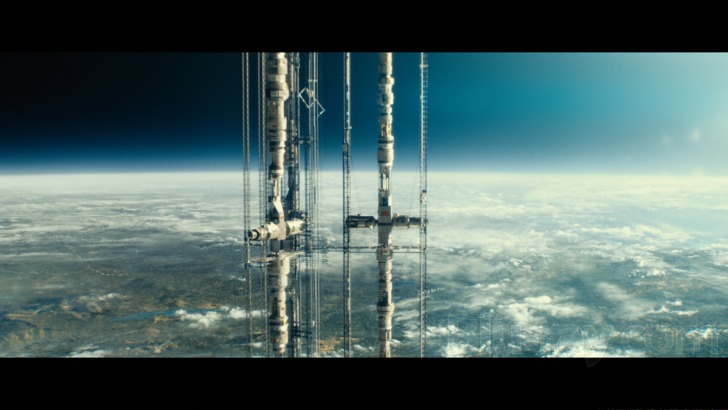
There are a number of kind of curious detours Ad Astra takes on its way to its (to quote a certain Cat Stevens) "father and son reunion", including a pirate shootout on the Moon and even more strangely a rescue mission which seems to suggest the primates of 2001: A Space Odyssey most definitely got smarter by touching the monolith (that's a joke, for those who may be wondering). The film probably has a few too many convenient coincidences for its own good, but it's anchored by a really interesting if intentionally tamped down performance by Brad Pitt, and while the visuals don't provide some of the gobsmacking proclivities of Kubrick's masterpiece, they often ape (sorry) Kubrick's mastery of symmetry and a kind of languorous, meditative quality. Technical merits are first rate on this 4K UHD presentation, with improvements in both video and audio, though the increased resolution of the video may point out some of the effects work and variances in grain resolution as outlined above. Ad Astra 4K comes Recommended.
Similar titles
Similar titles you might also like

Interstellar 4K
2014

2001: A Space Odyssey 4K
1968

The Martian 4K
Extended Edition
2015

Mission to Mars
2000

Star Trek: Picard - The Complete Series
2020-2023

Passengers
2016

Space: 1999: The Complete Series
1975-1977

Gravity
Includes "Silent Space" version
2013

High Life
2018

400 Days
2015

Contact
1997

2010: The Year We Make Contact
1984

Doctor Who: Tom Baker - Complete Season Six
1979-1980

Star Trek: Enterprise: The Complete Series
Budget Re-release
2001-2005

Moon
2009

Planet of the Apes
1968

The Expanse: The Complete Series
2015-2022

Blake's 7: The Collection - Series 2
1979

Close Encounters of the Third Kind 4K
40th Anniversary Edition
1977

Star Trek: The Motion Picture 4K
The Director's Edition | Remastered
1979

